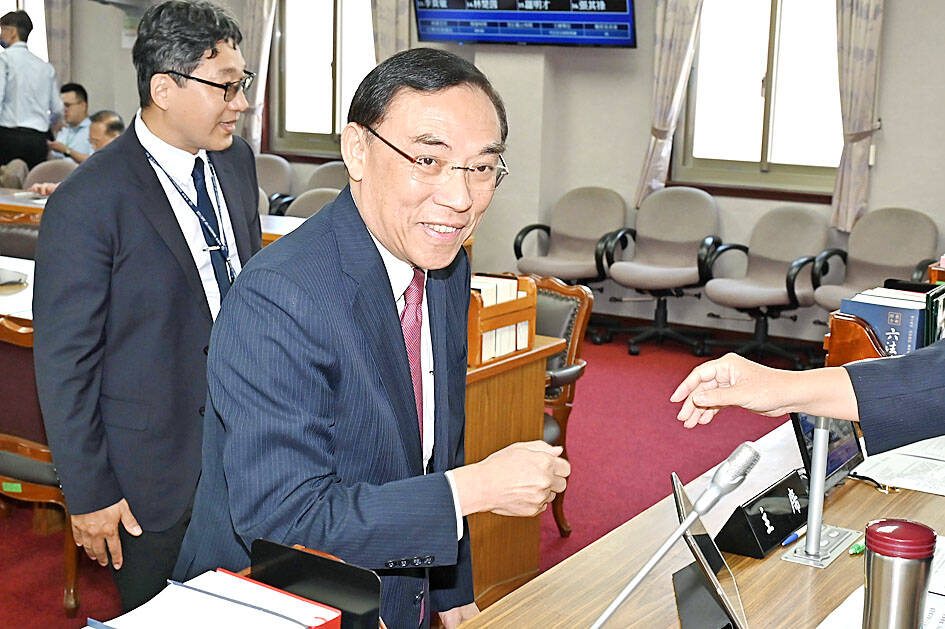The Ministry of Justice Investigation Bureau (MJIB) yesterday said it has seized NT$11.5 billion (US$354.6 million) in illegal remittances, as it warned that foreign actors are using remote funding, Internet betting and cognitive warfare to influence next year’s presidential and legislative elections.
Minister of Justice Tsai Ching-hsiang (蔡清祥) told a meeting of the legislature’s Judiciary and Organic Laws and Statues Committee that the ministry had conducted joint operations with the Taiwan High Prosecutors’ Office from July 3 to July 12 and from Sept. 20 to Sept. 26, targeting underworld banking operators to cut off cash flows funding illicit activities within the nation’s borders.
The ministry detailed how offshore funding is being used, including making donations to candidates via Taiwanese businesspeople, contributing to temple charity events, using dummy accounts to “like” specific candidates’ posts and funneling funds to candidates through unregistered banks or cryptocurrency.

Photo: Tu Chien-jung, Taipei Times
The MJIB is also to step up efforts to monitor Chinese coming to Taiwan on the pretext of “social interaction,” but who might be involved in attempts to influence the Jan. 13 elections or to conduct illegal activities, Tsai said.
When appropriate or necessary, it would launch investigations against individuals to deter foreign actors from using offshore funding to influence Taiwan’s political and financial activities, he added.
Separately, National Security Bureau (NSB) Deputy Director-General Hsu Hsi-hsiang (徐錫祥) yesterday said that the bureau is prepared to combat the use of deepfake technology by foreign actors to influence the elections.
The NSB has initiated a special project that incorporates other national security agencies to help affected ministries or agencies in issuing news releases to clarify the government’s stance and policies, Hsu said.
In addition, it is to train about 220 people to safeguard the presidential and vice presidential candidates, it said.
The teams would be assigned to the candidates once the registration process officially concludes on Nov. 24.
The NSB said it has included in its budget 220 bulletproof vests this year, along with 12 custom-made bulletproof vests and briefcases for the candidates and their running mates.
On Wednesday, the Central Election Commission (CEC) gave a demonstration of operations on the day of the elections, emphasizing the importance of polling station workers being able to handle emergencies.
The demonstration in Tainan covered the process for verifying a voter’s identity and casting ballots, as well as vote counting and how to respond in certain scenarios, such as a fire or the discovery of a suspicious package.
The ability of polling station workers to deal with unexpected situations is particularly important given the increasing competitiveness of election campaigns, CEC Chairperson Lee Chin-yung (李進勇) told city and county officials attending the demonstration.
The spread of false information and attacks from hostile foreign forces also mean that polling station workers need to strictly adhere to laws and regulations to avoid potential disputes, Lee said.
Local police also took part in Wednesday’s demonstration showing how to handle a range of situations, including individuals breaking the law by taking photographs or video recording voters within 30m of a polling station or leaving threatening notes in the station.
Additional reporting by CNA

CHAOS: Iranians took to the streets playing celebratory music after reports of Khamenei’s death on Saturday, while mourners also gathered in Tehran yesterday Iranian Supreme Leader Ayatollah Ali Khamenei was killed in a major attack on Iran launched by Israel and the US, throwing the future of the Islamic republic into doubt and raising the risk of regional instability. Iranian state television and the state-run IRNA news agency announced the 86-year-old’s death early yesterday. US President Donald Trump said it gave Iranians their “greatest chance” to “take back” their country. The announcements came after a joint US and Israeli aerial bombardment that targeted Iranian military and governmental sites. Trump said the “heavy and pinpoint bombing” would continue through the week or as long

TRUST: The KMT said it respected the US’ timing and considerations, and hoped it would continue to honor its commitments to helping Taiwan bolster its defenses and deterrence US President Donald Trump is delaying a multibillion-dollar arms sale to Taiwan to ensure his visit to Beijing is successful, a New York Times report said. The weapons sales package has stalled in the US Department of State, the report said, citing US officials it did not identify. The White House has told agencies not to push forward ahead of Trump’s meeting with Chinese President Xi Jinping (習近平), it said. The two last month held a phone call to discuss trade and geopolitical flashpoints ahead of the summit. Xi raised the Taiwan issue and urged the US to handle arms sales to

BIG SPENDERS: Foreign investors bought the most Taiwan equities since 2005, signaling confidence that an AI boom would continue to benefit chipmakers Taiwan Semiconductor Manufacturing Co’s (TSMC, 台積電) market capitalization swelled to US$2 trillion for the first time following a 4.25 percent rally in its American depositary receipts (ADR) overnight, putting the world’s biggest contract chipmaker sixth on the list of the world’s biggest companies by market capitalization, just behind Amazon.com Inc. The site CompaniesMarketcap.com ranked TSMC ahead of Saudi Aramco and Meta Platforms Inc. The Taiwanese company’s ADRs on Tuesday surged to US$385.75 on the New York Stock Exchange, as strong demand for artificial intelligence (AI) applications led to chip supply constraints and boost revenue growth to record-breaking levels. Each TSMC ADR represents

State-run CPC Corp, Taiwan (CPC, 台灣中油) yesterday said that it had confirmed on Saturday night with its liquefied natural gas (LNG) and crude oil suppliers that shipments are proceeding as scheduled and that domestic supplies remain unaffected. The CPC yesterday announced the gasoline and diesel prices will rise by NT$0.2 and NT$0.4 per liter, respectively, starting Monday, citing Middle East tensions and blizzards in the eastern United States. CPC also iterated it has been reducing the proportion of crude oil imports from the Middle East and diversifying its supply sources in the past few years in response to geopolitical risks, expanding